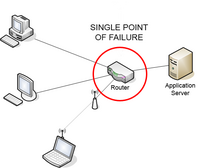
Photo from wikipedia
Molecular point of care tests has become promising methods for the global control of infectious diseases in recent years. Different kinds of point of care testing devices have been introduced… Click to show full abstract
Molecular point of care tests has become promising methods for the global control of infectious diseases in recent years. Different kinds of point of care testing devices have been introduced into the market in the last decade. They are mainly based on miniaturization and integration of sample processing, nucleic acid amplification, and detection systems. These devices must offer a low-cost, sensitive, specific, and practical analysis to be used especially in low-resource settings. Microfluidics has high potential for handling very small volumes of fluids on a single platform. The key design features for molecular point of care tests in resource-limited settings include isothermal nucleic acid amplification methods to eliminate the need for a thermocycler, lyophilized reagents for long-term stability at high temperature and relatively simple test procedures. CRISPR-Cas-based new generation molecular point of care tests have been developed in recent years. In these tests Cas enzymes are used as highly specific target sequence recognition elements. Collateral cleavage activity of these enzymes cleaves both target sequence and labeled RNA in the mixture and a signal is generated. The ongoing Coronavirus 2019 pandemic has shown the importance of rapid diagnostic tests for the prevention of further spread. Although real-time polymerase chain reaction method was used successfully for the rapid diagnosis during the pandemic, additional rapid and practical tests that could be performed outside the laboratories would provide even faster diagnosis and lighten the burden of test load in large central laboratories. Molecular point of care tests are considered to be one of the best candidates to fill the this gap in the near future. The future technology challenges will be the standardization of the methods and further miniaturization of the system components. In this review article, point-of-care tests adapted from nucleic acid amplification methods with a large number of studies in the literature and tests based on the CRISPR-Cas system which constitutes the newest group and which is among the point-of-care molecular tests based on new nextgeneration sequencing have been discussed.
Journal Title: Mikrobiyoloji bulteni
Year Published: 2022
Link to full text (if available)
Share on Social Media: Sign Up to like & get
recommendations!